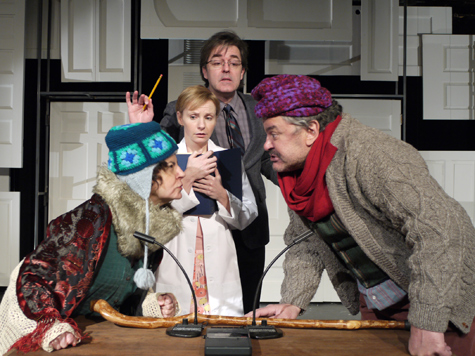
GETTING THE MESSAGE Spousal, and cultural, lingo in The Language Archive. |
George (James Hoban) has a knack for languages: He's a polyglot, can lovingly conjugate all tenses of even Esperanto, and has dedicated his life to preserving tongues on the brink of extinction. But that doesn't mean he has a knack for language — that is, for formulating the precise verbal symbols that will convey his inner thoughts and feelings to another human being. The problem more specifically, in Julia Cho's The Language Archive (directed by Dawn McAndrews in a beautiful production at the Public Theater), is that while George is a brilliant linguist, he cannot talk to his own wife.
Indeed his wife, Mary (Janet Mitchko), has grown sad. In fact, she's resorted to leaving him cryptic, anonymous notes inside books. Soon she leaves him entirely, and George is nauseated with hurt and befuddlement. But he's also in the midst of exciting work with the last two speakers of a (fictional) Slavic-sounding language: With the help of his pertly professional assistant Emma (Tarah Flanagan), he is trying to preserve the speech of a larger-than-life, sit-comically ethnic older couple, Alta (Andrea Gallo) and Resten (Edward Furs).
The communication between Alta and Resten is dysfunctional in a different way than that between George and Mary, in that it's a constant stream of put-downs about Mary's cooking, about the beau whom Mary should have married, about not being offered the window seat on the plane to America — you get the idea. So George, in addition to being seasick with lost love, is also frustrated in his noble mission to save a language. And on a stunning set, which includes towering bookshelves and a free-hanging collage of doors above the stage, he and the others navigate what language can close, and what it can open.
The use of linguistics as a dramatic device, as well as the antics and, eventually, the wisdom of Alta and Resten, allow Cho's script to explore some interesting ideas around language. It addresses the risk many tongues are in — every two weeks, George says, a language dies — but also the limitations of language, and its speakers, at large. He tells us of lethologica, the inability to recall key words and thus to express one's thoughts, and links it to cultural memory: When a member of a fading culture says that her world is gone, George says, what we understand is that "her word is gone." Then there are the limitations of language, certainly revealed not only by George's verbal gracelessness but also by an observation of Emma (who has been falling in love with George) about the emotional fluidity between grief and exhilaration, and how there is no good word for this.
At times the poignancy of these questions is diffused by the script's flurry of whimsy, coincidence, and sub-plots. The inventor of Esperanto (played by Furs) makes an appearance at a train station, and Emma gets romantic advice from a booming German woman (Gallo) reminiscing about the woman who got away. Mary winds up entrusted with the bakery of another man at a train station (also Furs), giving rise to a lovely but somewhat strained parallel between the language archive and starter dough.